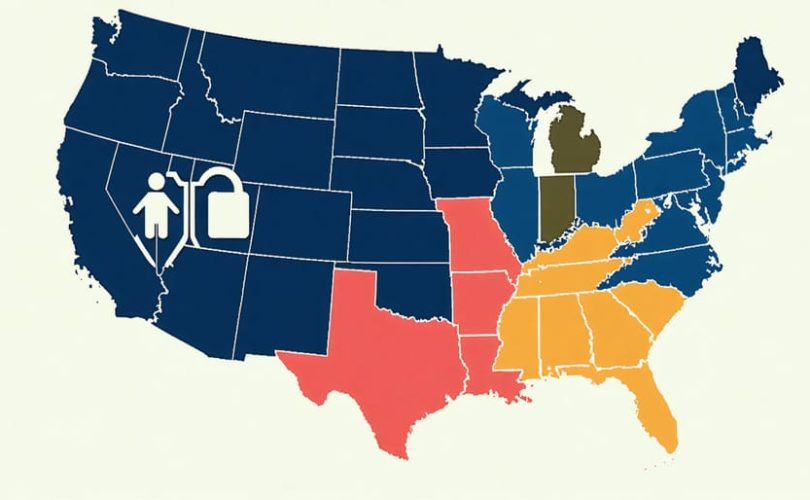Navigating mental health privacy laws across states can feel like walking through a maze, especially when it comes to protecting our children’s sensitive information. Every parent deserves to understand exactly how their child’s mental health records are protected – and these protections vary significantly from state to state.
Recent studies show that 1 in 5 children experiences a mental health condition, making privacy protection more crucial than ever. While federal laws like HIPAA provide a baseline of protection, state-specific regulations often offer additional safeguards that parents and professionals need to understand.
From California’s stringent privacy requirements for minors’ mental health records to New York’s comprehensive consent laws for adolescent treatment, each state has developed unique approaches to balancing privacy rights with necessary care access. These variations can significantly impact how families navigate mental health services, share information with schools, and coordinate care between providers.
Understanding these state-specific privacy laws isn’t just about compliance – it’s about ensuring our children receive the best possible care while maintaining their dignity and confidentiality. Whether you’re a parent seeking treatment for your child, a teacher supporting a student’s mental health needs, or a healthcare provider coordinating care, knowing your state’s specific requirements is essential for making informed decisions about mental health care.

Understanding HIPAA and Children’s Mental Health Records
When Parents Can Access Records
Under federal HIPAA privacy regulations, parents generally have the right to access their minor children’s mental health records until the child turns 18. However, there are important exceptions to consider. Mental health providers can deny parental access if they believe it could harm the child or compromise their safety.
In cases where the minor has consented to their own treatment (which varies by state), they may have control over who accesses their records. Additionally, if a child is receiving substance abuse treatment, separate federal laws may restrict parental access to protect the child’s privacy and encourage them to seek help.
Parents should know that while they typically have access rights, mental health professionals are trained to balance parental involvement with their child’s need for privacy and trust in therapy. This balance helps create a safe space where children feel comfortable discussing sensitive issues with their therapist.
If you’re concerned about accessing your child’s records, start by having an open conversation with their mental health provider about the therapeutic process and how you can best support your child’s treatment while respecting appropriate boundaries.
Special Protections for Minors
Most states provide additional privacy safeguards for minors seeking mental health treatment, recognizing the sensitive nature of these services. Young people aged 12-17 can often consent to certain mental health services without parental involvement, though specific age requirements vary by state. This protection encourages adolescents to seek help when they need it most.
Parents should know that while they generally have rights to accessing medical records for their children, there are important exceptions. When teens receive confidential mental health services, their records may be protected from parental view unless there’s a serious risk to the minor’s safety.
For example, in California, minors aged 12 and older can consent to outpatient mental health treatment and maintain confidentiality, while in New York, the age is 16. Healthcare providers must balance parental rights with the minor’s need for privacy and confidential care.
Some states also allow schools to provide limited mental health services to students without requiring parental consent, particularly in crisis situations. This ensures immediate support when needed while protecting student privacy.

State-by-State Privacy Variations
Age of Consent Differences
Understanding mental health consent requirements for minors can be complex, as age requirements vary significantly from state to state. While most states set the general age of consent for mental health treatment at 18, many have special provisions allowing younger individuals to seek care independently.
For example, in California, youth aged 12 and older can consent to outpatient mental health services. Washington state allows minors as young as 13 to initiate counseling without parental consent, while in Oregon, the age is 14. Some states, like Texas, maintain stricter requirements, generally requiring parental consent until age 18, with specific exceptions for emergency situations.
Dr. Sarah Martinez, a child psychiatrist, explains: “These varying age requirements reflect each state’s attempt to balance protecting young people while recognizing their growing autonomy and need for confidential mental health support.”
Parents should note that even in states with higher age requirements, exceptions often exist for crisis situations or specific mental health concerns. Additionally, many states have “mature minor” doctrines, allowing healthcare providers to treat younger patients who demonstrate the capacity to make informed decisions about their mental health care.
For the most current information about your state’s specific requirements, consult with local mental health providers or legal resources, as these laws can change over time.
Confidentiality Requirements
Every state has specific rules about protecting your child’s mental health information, but there are some common elements across the country. Generally, mental health providers must keep all therapy sessions, diagnoses, and treatment plans confidential. This means they can’t share information without proper authorization, typically from a parent or legal guardian for minors.
However, there are important exceptions to these confidentiality rules. Mental health professionals must report certain situations, including suspected abuse or neglect, immediate threats of self-harm, or potential harm to others. These “duty to warn” requirements vary by state, but they prioritize safety while still maintaining as much privacy as possible.
Some states have additional protections for sensitive information, such as substance use treatment or HIV status. Many also have special provisions for teens, allowing them more privacy rights as they get older. For example, in some states, adolescents can consent to certain mental health services without parental involvement.
Schools also play a role in maintaining confidentiality. While they need some information to provide appropriate support, they must follow both state privacy laws and federal regulations like FERPA. This ensures that your child’s mental health information is shared only with those who truly need to know.
Remember, these laws exist to protect your child while ensuring they get the care they need. If you’re unsure about privacy rules in your state, don’t hesitate to ask your child’s mental health provider for clarification.
School Records and Mental Health
School records containing mental health information are protected under both FERPA (Family Educational Rights and Privacy Act) and state-specific laws. These regulations ensure that sensitive details about a student’s mental health remain confidential while allowing necessary access for appropriate school personnel.
Parents and eligible students have the right to review educational records, including any mental health-related documentation maintained by the school. This includes counseling records, psychological evaluations, and behavioral assessments. However, private notes kept by school mental health professionals for their personal use are not considered educational records and remain confidential.
Most states require written parental consent before schools can share mental health information with outside providers or agencies. Some exceptions exist for emergency situations or when there’s an immediate safety concern. School counselors and psychologists must balance student privacy with their duty to inform parents about serious mental health concerns.
Many states have additional protections for certain types of mental health records in schools. For instance, some require separate storage of mental health documentation from general educational records, while others mandate specific training for staff who handle sensitive mental health information.
Schools typically develop detailed protocols for managing mental health records, including who can access them, how they’re stored, and when they can be shared. These protocols must comply with both federal and state requirements while ensuring students receive appropriate support and care.
Navigating Common Privacy Challenges
Divorced Parents and Record Access
Navigating mental health records access after divorce can be challenging for parents and healthcare providers alike. The key principle governing access rights is the custody arrangement specified in the divorce decree. Parents with legal custody, whether joint or sole, typically maintain the right to access their child’s mental health records, though specific state laws may vary.
For joint legal custody arrangements, both parents generally have equal rights to access their child’s mental health information, regardless of physical custody arrangements. However, if one parent has sole legal custody, they may have exclusive rights to these records, and the other parent might need court approval for access.
Dr. Sarah Martinez, a family therapist, emphasizes the importance of clear communication: “When both parents stay informed about their child’s mental health care, it often leads to better outcomes. However, privacy concerns must be balanced with the child’s therapeutic needs.”
Some states have additional protections for sensitive information in divorce situations. For instance, if a teen is receiving counseling related to family conflicts, therapists might limit certain details in shared records to protect the therapeutic relationship.
Healthcare providers should always verify custody arrangements through official documentation before releasing records to either parent. When in doubt, they may require a court order to clarify access rights, ensuring both child privacy protection and appropriate parental involvement in mental health care decisions.
Electronic Health Records
As healthcare increasingly moves into the digital realm, protecting your child’s mental health records requires special attention. Modern digital health record protection varies significantly by state, with some offering stronger safeguards than others.
Most states have adopted specific regulations for electronic health records (EHRs) that complement federal HIPAA requirements. These laws typically address how mental health information can be stored, shared, and accessed electronically. For example, some states require additional encryption standards or mandate specific security protocols for mental health data.
Parents should know that they generally have the right to access their child’s electronic mental health records and control who else can view them. However, once children reach a certain age (which varies by state), they may gain some control over their own records’ privacy settings.
Healthcare providers must implement security measures like:
– Password protection and multi-factor authentication
– Audit trails tracking who accesses records
– Secure messaging systems for communication
– Regular security updates and monitoring
If you’re concerned about your child’s mental health records’ privacy, talk with their healthcare provider about their specific security measures and state requirements. Many providers now offer patient portals where you can actively manage privacy settings and monitor record access.

Advocating for Your Child’s Privacy
As a parent, you play a crucial role in safeguarding your child’s mental health information. Start by having open conversations with healthcare providers about their privacy policies and information-sharing practices. Ask specific questions about how they protect electronic records and who has access to your child’s information.
Request written documentation of all privacy policies and keep detailed records of any conversations about your child’s mental health care. When signing consent forms, read them carefully and don’t hesitate to ask for clarification about terms you don’t understand.
Consider creating a privacy folder that includes copies of all signed agreements, treatment plans, and communication preferences. This organization helps you track who has permission to access your child’s information and under what circumstances.
Be proactive in school settings too. Meet with school counselors and administrators to understand how they handle mental health information. Request written documentation of their protocols and establish clear boundaries about sharing information between school staff members.
Remember that you have the right to limit information sharing. You can specify which details healthcare providers can share with schools or other professionals. Trust your instincts – if something doesn’t feel right about how your child’s information is being handled, speak up.
Most importantly, involve your child in age-appropriate discussions about their privacy rights. This helps them develop self-advocacy skills and understand the importance of protecting their personal information as they grow older.
Understanding and navigating mental health privacy laws can feel overwhelming, but staying informed is crucial for protecting our children’s wellbeing and rights. As we’ve explored, these laws vary significantly from state to state, creating a complex landscape for parents, educators, and healthcare providers to navigate.
Remember that privacy protection is not just about following rules – it’s about creating a safe, supportive environment where children feel comfortable seeking mental health care. By understanding your state’s specific requirements and keeping up with any changes in legislation, you can better advocate for your child’s needs while ensuring their privacy remains protected.
If you’re ever unsure about your rights or responsibilities, don’t hesitate to consult with mental health professionals or legal experts in your area. They can provide guidance specific to your situation and state requirements. Additionally, many states offer resources and support services to help families understand and navigate these important privacy protections.
Stay engaged with your local mental health community and advocacy groups, as they often provide updates on changing laws and can be valuable sources of support and information.




